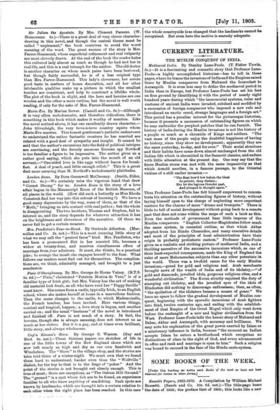C URRENT LITERAT URE.
THE MUSLIM CONQUEST OF INDIA.
Mediaeval India. By Stanley Lane-Poole. (T. Fisher ITnwin. 5s.)—It is a fascinating and romantic story that Professor Lane- Poole—a highly accomplished historian—has to tell in these pages, where he traces the invasions of India and the Empires raised there by Muslim conquerors from Mahmud the Iconoclast to Aurangzib. It is even less easy to define the mediaeval period in India than in Europe, but Professor Lane-Poole has set his feet on firm ground by identifying it with the period of nearly eight hundred years during which "the immemorial systems, rules and customs of ancient India were invaded, subdued and modified by a succession of foreign conquerors who imposed a new rule and introduced an exotic creed, strange languages and a foreign art." This period has a peculiar interest for the picturesque historian, because it presents a succession of outstanding figures on which he may embroider the purplest patches that he can furnish. The history of India during the Muslim invasions is not the history of a people so much as a chronicle of Kings and soldiers. "The vast mass of the people enjoy the doubtful happiness of having no history, since they show no development; apparently they are the same yesterday, to-day, and for ever." Their social structure and their habits have come down almost unchanged from the old Indian life which is chronicled in the Sanscrit classics, and endure with little alteration at the present day. One may say that the fierce Muslim storm was met with the same impassivity as that which Arnold ascribes, in a famous passage, to the Oriental victims of a still earlier invasion :— "The East bow'd low before the blast Inpatient, deep disdain;
She let the legions thunder past, And plunged in thought again."
Thus Professor Lane-Poole has felt himself empowered to concen- trate his attention on the outstanding figures of history, without laying himself open to the charge of neglecting more important matters for the charms of mere "drums and trumpets." There is little to tell of social development without going back to a remote past that does not come within the scope of such a book as this. Even the methods of government bear little impress of the Muslim conquerors. "English Collector-Magistrates follow much the same system, in essential outline, as that which Akbar adopted from his Hindu Chancellor, and many executive details and most of the principles of local administration have their origin in probably prehistoric custom." Professor Lane-Poole gives us a realistic and striking picture of mediaeval India, and a thrilling narrative of the successive incursions which, as one of their least-expected consequences, made the King of England the ruler of more Mahommedan subjects than any other potentate in the world. There was a twofold cause for the early Muslim invasions,—greed for gold and religions zeal. Arab merchants brought news of the wealth of India and of its idolatry,—" of gold and diamonds, jewelled idols, gorgeous religious rites, and a wonderful civilisation." The Koran strictly enjoined the duty of stamping out idolatry, and the jewelled eyes of the idols of Hindostan did nothing to discourage enthusiasm; then, as often, "the spoliation of the idolaters became a means of grace." We have no space to follow the gradual development of Muslim con- quest, beginning with the sporadic incursions of Arab fighters into Sind, twelve centuries ago, and ending with the establish- ment of that Empire of the Great Mogul which only went down before the onslaught of a new and higher civilisation from the West. Professor Lane-Poole tells the heroic story of Mahmud and Babar, Akbar and Aurangzib, with accuracy and brilliance. We may note his explanation of the great power exerted by Islam as a missionary influence in India, because "the moment an Indian accepts Islam he enters a brotherhood which recognises no distinctions of class in the sight of God, and every advancement in office and rank and marriage is open to him." Such a religion was bound to succeed in the face of the Hindu caste-system.






































 Previous page
Previous page